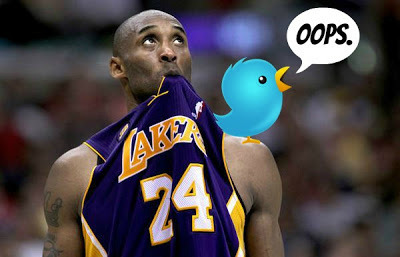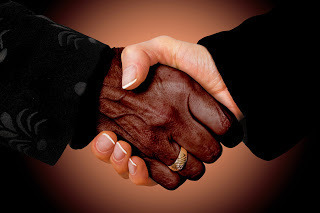Public Figures and Social Media: Some Guidelines and a Little Advice

Who is a public figure?
When can you quote something a public figure posts online?
These are two legitimate questions, and I'd like to tackle the second question first, using a recent example. The San Antonio Spurs recently swept the Los Angeles Lakers in the first round of the NBA playoffs. But was this the big news? That's debatable. Many media outlets made a bigger deal out of injured Lakers star Kobe Bryant's tweets from the sidelines.
Most of Bryant's tweets involved analysis and tips for the team. Here's a sampling (misspelled words are sic):
"I love how Nash is moving so far. Both teams a lil out of rhythm to start.""@nabarocksstc I agree. Lethargic start for us. Gotta minimize little mistakes like giving the middle drive on close outs""Nothing worse then watching your bothers struggle and u can't do crap about it #realtalk"
Bryant was obviously frustrated that he couldn't be out on the court with his teammates (a torn Achilles' tendon saw to that), so he was trying to "play" vicariously through his Twitter account.
Bryant certainly knows he's a public figure, and he must have realized that the media were going to see his tweets. Still, he didn't seem to realize how heavily the media were going to emphasize his comments, and he eventually decided to stop tweeting: "I see my tweeting during the game is being talked about as much as the game itself," he wrote. "CHOOSE not [to]. Focus should be on the team not my insight."

Now to the second question: Who is a public figure?
There are two ways one can qualify for this label: First, you can become a public figure by becoming famous. But famous people aren't the only public figures. You can also become what's called a limited purpose public figure. According to the Reporters Committee for Freedom of the Press, this is "someone who is not so famous as to be a household name, but who has become well known with regard to a particular issue."
People who seek the limelight often fall into this category. Authors Tad Crawford and Kay Murray put it this way in The Writer's Legal Guide : "Private individuals can become 'limited purpose public figures,' when they actively, voluntarily or willfully seek the public eye."
This applies perhaps no more clearly than to people whose name is their franchise. Artists, authors, solo musicians and some athletes fall into this category. Names like Kobe, Tiger, Madonna, Stephen King and Taylor Swift come to mind. If you're marketing your name, you're a limited purpose public figure. If you're marketing your name and you're famous (such as the above folks), there's nothing limited about it. You're a public figure, period.
One must assume that a public figure speaking on a public forum such as Facebook or Twitter is making what amounts to a public statement. Is it OK to quote one? Sure, it is - unless the person being quoted can demonstrate the other person 1) is guilty of defamation and 2) has "actual malice" toward him or her.

Bursting the bubble
So, how should a public figure act on Twitter or Facebook? And how should other social media users behave when quoting public figures (beyond the obvious of avoiding defamatory and malicious statements)?
If you're a public figure posting on Facebook or Twitter, make sure your posts are something you'd be proud to have repeated. Too often, people on social media act like the driver who rocks out to his favorite tunes or flips off a police officer from behind the wheel, assuming no one else can see him. He's wrong. The privacy bubble he thinks exists within the confines of his Fiat or El Dorado is an illusion. The roadway is public, and so are the social media.
In fact, Facebook and Twitter are both actually designed to make quoting people as easy a single mouse click. Each has its own handy dandy tool: On Facebook, it's called the "Share" option; on Twitter, it's "Retweet." Don't want to be quoted? Simple. Keep it off your Facebook wall or Twitter feed. Both services offer private mail/messaging features that are easy to use, perfect for more confidential interactions (but be careful: nothing online is entirely confidential).

Show some respect
So, if you want to quote another person's post on Facebook or Twitter, you don't have to ask. But you shouldn't use their posts as an excuse to excoriate them in public. It's better to treat people with respect than think you can act with impunity. You're not in a bubble, either.
Never quote someone's Facebook or Twitter post out of context. Make sure you're fairly representing what the person said, not twisting it to fit your own agenda. Don't make someone appear to agree with you or support your position by manipulating their quotes. That's flat-out unethical.
It's also unethical to pass off someone else's words as your own. That's called plagiarism, and it's just as unacceptable online as it is on a college term paper. If you're quoting someone, include attribution.
One more tip: Be sure you're quoting the person you think you're quoting. There are any number of people out there who think it's fun to impersonate public figures - especially on Twitter. If you don't believe me, try doing a search for Rowan Atkinson on Twitter and see how many results pop up. Is any of them the real Rowan Atkinson? When in doubt as to someone's identity, don't quote the person. It's better to follow the account for a while, crosscheck it with other facts you find online and make sure the person is the genuine article.

Exposure has its price
If you're a public figure posting something on Facebook or Twitter, every post you make is an official statement, as surely as if you'd sent out a news release. Are you a public figure who uses social media largely to promote yourself? Do you have a banner on your Facebook page that promotes your latest album? Does your Twitter account identify you as "the author of ..."? If so, you're using the social media as a marketing tool, and its contents must be viewed as representing the product: you. You have an obligation - not only to your potential customers, but to yourself - to represent yourself with dignity.
If you're debating something, whether on Facebook or blogging back and forth, don't get drawn into heated arguments, don't make it personal. Keep it about the issues.
That doesn't mean you should be afraid to be passionate. If you believe in something, say so. For instance, I believe strongly in equal rights, same-sex marriage, freedom of (and from) religion, and standing up to bullies. If I post something about my beliefs on one of my social media sites, I shouldn't have a problem being quoted. In fact, if I really do believe in it, I should be proud of the stance I've taken and should be glad when others share my words. That said, it's in my own interest not to come off as shrill or defensive. When that happens, the tone overpowers the message.
And finally, if you're a public figure and someone quotes you fairly and accurately from the social media, with attribution and respect, don't complain about it. Go with it. Even if the person disagrees with you, it's free publicity, and that never hurts. Besides, you might just learn something.

Published on May 10, 2013 10:55
No comments have been added yet.



